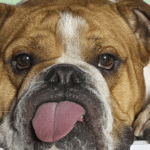Is your English Bulldog breathing fast? If so, you may be wondering what could be causing this rapid respiration. While it’s normal for dogs to pant after exercise or when excited, persistent and fast breathing can sometimes indicate an underlying issue.
We’ll delve into the reasons behind your furry friend’s speedy breaths and explore when you should be concerned about their breathing patterns. So please sit back, relax, and uncover why your English Bulldog may be breathing faster than usual.
Why Is My English Bulldog Breathing Fast?
First and foremost, it’s essential to understand that English Bulldogs have a distinct anatomy contributing to their rapid breaths. Their short snouts and flat faces, known as brachycephalic features, can hinder normal airflow, leading to more rapid respiration.
Environmental factors such as heat or high humidity can also cause your Bulldog to breathe faster than usual. Like other dogs, they regulate body temperature by panting – an effective way to cool down. So, if you notice your Bulldog panting rapidly on a hot day or after strenuous exercise, there’s generally no need for immediate concern.
Respiratory infections or allergies could be possible culprits behind the increased respiratory rate. If your Bulldog has persistent coughing or wheezing and fast breathing, it’s best to consult your veterinarian for proper diagnosis and treatment.
Awareness of potential triggers for rapid respiration in your English Bulldog is crucial in determining whether further action is necessary. Remember that while occasional quick breaths may be expected for these adorable pups due to their unique physiology and environmental factors like heat or excitement, consistent heavy panting without apparent reasons could warrant a trip to the vet’s office just for peace of mind!
When should I worry about my bulldog breathing?

When it comes to our furry friends, their health and well-being are always a top priority. So, when you notice that your English Bulldog is breathing fast, it’s natural to feel concerned. But at what point should you start worrying?
First and foremost, it’s essential to understand that Bulldogs naturally have a unique respiratory system due to their brachycephalic (short-nosed) structure. This means they may breathe more heavily compared to other dog breeds. However, there are certain instances where fast breathing can indicate a potential problem.
If your Bulldog struggles to catch its breath even during rest or seems excessively panting after minimal physical exertion, this could be cause for concern. Additionally, if you observe any signs of distress, such as wheezing or gasping for air, it’s crucial not to ignore these symptoms.
Other red flags include blue gums or tongue – an indication of oxygen deprivation – and collapsing episodes while exercising or in hot weather. These situations warrant immediate veterinary attention as they could be signs of a severe condition called Brachycephalic Airway Syndrome.
Why is my English bulldog breathing fast while sleeping?
Why is it that sometimes, when you glance at your English bulldog sleeping peacefully, you notice their breathing seems a bit faster than usual? It’s natural to feel concerned and wonder what could be causing this. Let’s explore why your English bulldog may be breathing fast while sleeping.
Dreams or nightmares could trigger one reason for rapid breathing during sleep in English bulldogs. Just like humans, dogs can experience vivid dreams during their sleep cycle. These dreams might evoke excitement or fear, leading to increased respiration rates as they react to the dream world unfolding in their minds.
It’s important not to ignore excessive panting or gasping for breath from your Bulldog during sleep, as these may indicate an underlying health issue needing attention. If you observe any concerning symptoms beyond occasional rapid breaths – such as wheezing, coughing, or choking sounds, it’s advisable to consult a veterinarian for a thorough examination.
Old English bulldog breathing problems
Old English Bulldogs are known for their adorable wrinkled faces and endearing snorts and snores. However, when it comes to their breathing, there can be some concerns. Like any other breed, Old English Bulldogs may experience breathing problems affecting their overall health and well-being.
One common issue is brachycephalic airway syndrome. Due to the shape of their skull and shortened muzzle, these dogs often have narrow nasal passages and elongated soft palates. This can make it difficult for them to breathe correctly, especially during physical activity or in hot weather.
If you notice your Old English Bulldog having difficulty catching its breath or if its fast breathing persists even at rest, it’s essential to consult with a veterinarian. They can properly diagnose the underlying cause of the breathing problems and recommend appropriate treatment options.
Bulldog breathing problems treatment

If you’ve noticed that your English Bulldog is breathing fast, addressing the issue and seeking appropriate treatment is essential. While some dogs may tend to breathe heavily due to their breed characteristics, excessive panting or rapid breathing could be an indication of an underlying problem.
To ensure the well-being of your furry friend, it is crucial to consult with a veterinarian who specializes in Bulldogs or respiratory issues. They will perform a thorough examination and possibly recommend further diagnostic tests such as X-rays or bloodwork.
The treatment for bulldog breathing problems depends on the specific cause identified by the vet. In cases where there are no underlying health issues, management techniques can be implemented to alleviate any discomfort your Bulldog may experience:
1. Keep them cool: Bulldogs are prone to overheating due to their short snouts and compromised airways. Ensure they have access to fresh water at all times, and provide a relaxed environment with proper ventilation.
2. Avoid strenuous exercise: Intense physical activity can strain their compromised respiratory system. Opt for gentle walks instead of vigorous exercise sessions.
3. Maintain a healthy weight: Obesity exacerbates breathing difficulties in Bulldogs, so maintaining an ideal body weight through balanced nutrition is essential.
4. Use humidifiers: Dry air can irritate your Bulldog’s airways, leading to increased respiratory distress. Consider using humidifiers in areas where they spend most of their time.
5. Medication options: Your vet may prescribe medications such as bronchodilators or anti-inflammatory drugs if necessary, depending on the diagnosis.
By seeking early intervention and providing appropriate care explicitly tailored for bulldogs experiencing breathing issues, you can help ensure your furry friend leads a happy and healthy life.


